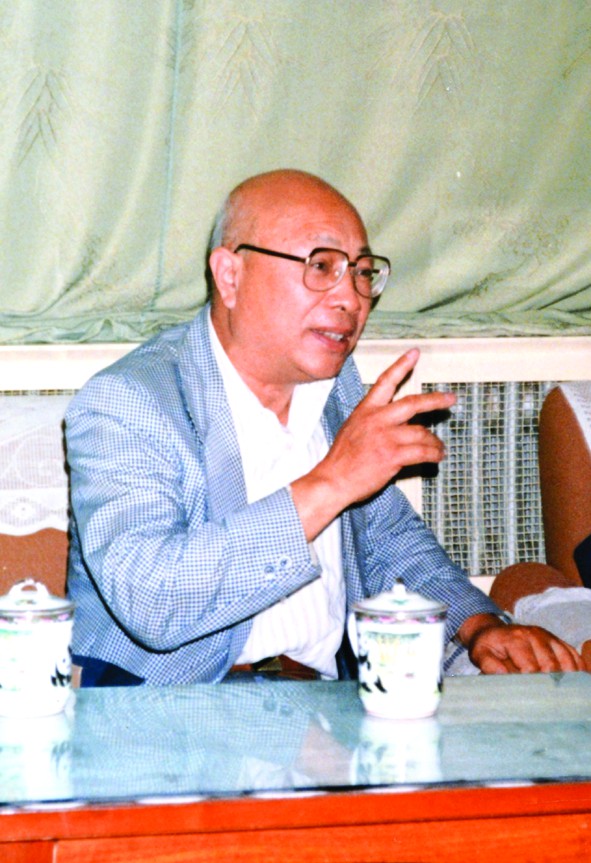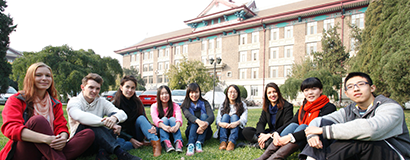
Working on science and technology, Professor Liu Bao had a sharp eye for detail, with determination in practice. He played an important role in the development of China’s system engineering discipline. From the practice of technological management, he observed that, as the world changed, human race would face more social and economic problems which were more complex than problems of engineering system and were in urgent need to be solved by researches and technical means. After the 1978’s National Science Conference, Liu founded the Institute of System Engineering at Tianjin University, which was one of the first professional institutions in system engineering research in China. In 1980, Liu founded the Systems Engineering Society of China with his colleagues in science and technology field and later established the Committee of System Engineering of China Energy Research Society.
To ensure that the officially proposed economic and social development policies have a scientific basis, Liu Bao, with his rich knowledge and achievements in dynamic system identification, led a research team to propose a set of socio-economic system modeling theory after years of efforts, which provided effective solutions to some of the problems in the socio-economic system. He also proposed a multi-level and multi-branch optimization method to promote the scope of application of optimization rules.
Liu actively organized training to promote China’s energy planning. In 1982, the State Scientific and Technological Commission and the European Community signed an agreement to establish the Tianjin Energy Planning Training Center at Tianjin University. The Center which has trained more than 400 specialists in energy planning for the country and expanded China’s international cooperation and exchange in this field.
When the Analytic Hierarchy Process (AHP) proposed by Professor Saaty of the University of Pittsburgh was introduced to China in the early 1980s, Liu Bao noticed that it was simple, effective and easy to be accepted by decision makers. He, together with his colleagues, carried out many researches and work in promotion and application, which made AHP widely used in China’s science and technology, management, and military, among other fields.
Devotion to Education
As one of the earliest “overseas returnees” in New China, Liu Bao realized the importance of talent to the country’s advancement and spent his whole life cultivating talents for China. Shang Binyi, Liu’s student, once said: “Mr. Liu is a representative of the older generation of intellectuals. He embodies the love, enthusiasm and zeal of that generation of intellectuals for country, nation, academic research, career and students. In this sense, Mr. Liu represents a generation.”
1.Responsible Education Spirit
After the founding of New China, the economic construction was in urgent need of talents in automation technology, but there was no training base in China. Faced with this situation, Liu Bao, who studied automation in the United States, was invited to Tianjin University in 1954 to open the first new class of chemical automation in China. In 1956, he set up a course on “Principles of Automatic Control” for the Department of Precision Instrument Engineering. In the same year, he presided over the founding of Chemical Instrumentation and Automation Major, which was the first automation instrumentation major in the country. The Institute of System Engineering of Tianjin University, which was established by him, became one of the first batches of doctoral programs and master programs and one of the earliest units for key disciplines in China. The talents he had trained have held leading positions or become the backbone of science and technology in national ministries and commissions, scientific research, educational institutions or large enterprises and companies.
2.Open and Inclusive Concept in Teaching
Liu Bao had been actively involved in exchanges with the international academic community, trying to learn advanced foreign technology. He was determined to let China reach out to the world and let the world know China. In terms of domestic academic exchanges, Liu Bao presided over the annual meeting of Systems Engineering Society of China, the National Automation Instrumentation Professional Steering Committee and other important academic meetings. He had been invited to Chongqing University, Shanghai Institute of Mechanical Engineering, Beijing Institute of Technology, Tsinghua University and other universities to give numerous academic presentations, and was appointed as a consultant professor of Chongqing University, and Northern Jiaotong University. In terms of academic review, he had served as an expert on several major national review boards and committees, and had also participated in the National Soft Science Review Board. He had been a member of the Systems Engineering Committee of the International Federation of Automatic Control (IFAC) since 1984 and became the vice-chairman of the Committee in 1987. In 1988, he also chaired the first International Symposium on the Analytic Hierarchy Process. Over the years, Liu had conducted collaborative research and lectures at Kobe University (Japan), University of Padua (Italy), Ruhr University and University of Regensburg (Germany), London Metropolitan University (UK), McMaster University, University of Waterloo (Canada), University of Pittsburgh (USA) and other world-renowned universities. He had also served as an editor of international journals, and edited the Journal of Forecasting and Journal of System Science and System Analysis. Through his efforts, more and more Chinese students had access to the world’s highest level of academic research, and had increased their knowledge and skills.
3.Excellent Research Attitude
As the leader of the Institute of System Engineering, Tianjin University, Liu Bao attached importance to talent and encouraged students and colleagues to think, innovate and be open. Liu Bao was a “strict teacher” in his students’ eyes. He revised each student’s paper repeatedly, paying attention to every detail. His student, He Guoguang, once said when he described Liu Bao, “Mr. Liu’s strictness was reflected in his actions. He was always studying, and we had to learn constantly to keep up. Actions have the greatest impact, much more profound than what you say.” Mr. Liu’s style of “rigorous scholarship and strict requirements” was passed down from one generation of teachers to the next. One of his students recalled, “Mr. Liu was very open-minded and valued talents. He would bring in anything he thought would be beneficial to the development of science, and constantly encouraged his team members to innovate. He was very fair in dealing with problems and never favored one over the other. He would be pleased with the achievements of anyone, and he would create opportunities for those who came up with great ideas.” After the establishment of the Institute of System Engineering, Liu asked everyone to have an academic exchange once in a week. “We would exchange what literature we read and what new ideas we had, and we often organized meetings to exchange ideas with other organizations.” His colleagues and students recalled, “The achievements of the Institute of System Engineering today were accumulated bit by bit under the leadership of Mr. Liu.”
4.Warm and Delicate Heart
For students’ academic instructions, Liu Bao was good at using a variety of ways. The student Zhang Wei still remembered: after the first paper was written and handed to Mr. Liu to revise, Liu’s comment was “bare-bones without flesh, and the lack of explanation and analytical discussion makes it difficult for readers to understand your innovation.” When Zhang Wei submitted the revised version, Liu laughed, “This is over decorated.” Zhang Wei was confused and asked, “Isn’t it supposed to have bones and flesh?” Liu said, “Yes, but it should be muscles, not flab.” This vivid analogy made it easy for students to understand their own shortcomings. In the early 1980s, to better train his graduate students, Liu Bao not only organized the faculty, but also overcame difficulties to invite overseas professors such as Kazumasa Hirai of Kobe University in Japan and Umberhahn of Ruhr-Universität Bochum in Germany to give courses to his students. When taking students to major conferences, Liu did not introduce his students to meet with famous scholars, but encouraged them to communicate on their own, he said: “You should take the initiative to talk with others yourself. If you have interesting ideas, people will naturally have resonance. If you yourself have no insight, what is the use of introduction?” This method of education had given students more independence and better expressive skills. In 1993, Mr. Liu’s student He Guoguang faced difficulty with housing. Liu learned about it and asked He to come and live with him for a year, and he also requested the school to solve his housing problem immediately. For students, Liu Bao had always affected and educated the people around him in a subtle way.
Facing Life’s Ups and Downs Bravely
Liu Bao had two paintings hanging on the wall at his home, one of which was Mr. Liu Haisu’s calligraphy “The Great View of the Universe”, showing that scholarship should be both high and pragmatic. The other one was “Not disturbed by prosperity or adversity, I witnessed the blossom and wither of flowers. Not minding staying or leaving, I watched the scudding and clearing of clouds.” This was also a true portrayal of Liu Bao - however high the honor was, he was indifferent to fame and wealth. The mentality had sustained Liu Bao through countless ups and downs.
1.He is a Simple and Easy-going Old Man
Fan Yichang, one of his students, said, “Once he and I went away on a business trip and arrived at Beijing West Railway Station, I asked him where we were going to eat, he said, ‘Just buy some buns on the side of the road.’ I never felt any pressure when I was with Mr. Liu, and he always influenced the people around him by personal example as well as verbal instruction."
2.He is a Graceful and Peaceful Old Man
In his life, Liu Bao had trained more than 80 master’s students and 20 doctoral ones, two of whom have become academicians. With his own practice, he demonstrated how to do his job for the country and the nation, and reminded everyone to keep a clear mind and maintain self-control against the endless temptations of fame and fortune.






